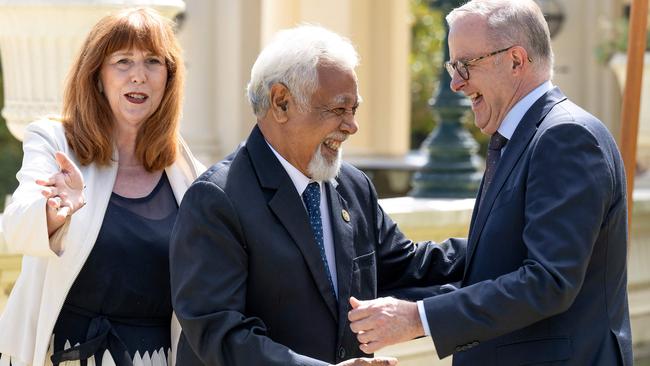Aussie companies vow $5bn Malaysia investment at ASEAN
Eight companies have signalled their willingness to commit more than $5.2bn on the sidelines of the ASEAN-Australia summit.

Eight Australian companies have signalled their willingness to commit more than $5.2bn of investment into Malaysia on the sidelines of the ASEAN-Australia summit, with Anthony Albanese saying he now expected greater regional engagement from banks, financial institutions, as well as energy and resource companies.
Malaysian Trade and Investment Minister Tengku Zafrul Aziz, told The Australian on Thursday that eight companies had already “committed investment in Malaysia totalling $5.2bn Australian dollars”. Businesses that had discussed increasing investment into the Southeast Asian nation included Fortescue, Lynas, Macquarie Group, NextDC, Arnott’s Group and AirTrunk.
Mr Albanese – whose centrepiece announcement at the summit was a $2bn facility to drive greater investment into the region’s clean energy transformation – said the summit had “elevated the relationship between Australia and ASEAN to a higher level”.
But Mr Albanese warned that in the race to tap the region’s economic potential, “I think our biggest rival is ourself (Australia)”.
“If we are not optimistic, if we don’t seize the opportunities which are there, if we shrink-in on ourselves not just through our economic actions but frankly some of our rhetoric … (this does) not give confidence for our Southeast Asian neighbours to engage with us,” he said.
He “certainly” expected greater investment commitments by Australian companies given the “list of major businesses” that attended the summit, including the “CEO’s of banks and financial institutions”.
“You had resources companies (attending). You had manufacturing and you had energy companies all wanting to participate,” he said. “And I believe very firmly this will lead to further Australian investment in our region.”
The summit reached agreement on a new “Melbourne Declaration”, which set out the roadmap for the next 50 years of partnership between Australia and ASEAN.
Areas for future co-operation included a deepening of economic and cultural ties while strengthening educational and environmental outcomes. The document recognised the importance of free trade and open markets, as well as the need to address climate change and urgent priority attached to reaching net zero emissions.
It welcomed Mr Albanese’s announcement of a new ASEAN-Australia Centre and additional scholarships and fellowships to build connections with the region.
While the document did not name China, it recognised the benefits of “having the South China Sea as a sea of peace, stability, and prosperity” and encouraged countries to “avoid any unilateral actions that endanger peace, security and stability in the region”.
It pushed for an “immediate and durable humanitarian ceasefire” in Gaza and supported the “UN Relief and Works Agency for Palestine Refugees in the Near East (UNRWA) in the execution of its mandate”.
Pressed on Canada’s decision to reinstate funding to UNRWA after it paused funds in January after allegations that employees of the agency were involved in the October 7 attack on Israel, Mr Albanese said Australia had “expressed our deep concern about the humanitarian crisis that we see ongoing in Gaza”. “We remain concerned about that … We want humanitarian assistance to be able to be delivered to the people of Gaza. This is a dire and catastrophic circumstance that we see.”
Mr Albanese – who met with his Laotian counterpart on Wednesday – also made clear that Australia disapproved of any unsafe and destabilising behaviour in the South China Sea after four members of the Philippine Coast Guard were injured in a collision with a Chinese vessel in the waterway.
A joint leaders “vision statement” released on Wednesday committed ASEAN members to promoting “an open, inclusive and transparent rules-based regional architecture in the Indo-Pacific region”. “We want a region where sovereignty and territorial integrity is respected. We strive for a region where differences are managed through respectful dialogue, not the threat or use of force. We seek a region where disputes are settled peacefully,” it said.








To join the conversation, please log in. Don't have an account? Register
Join the conversation, you are commenting as Logout